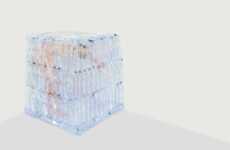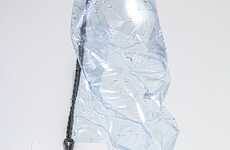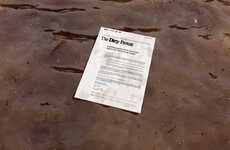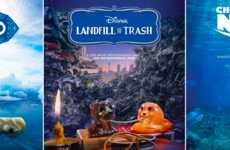
The 'Why People are Eating Their Own Trash' Chart is Shocking
Vivian Lau — May 7, 2012 — Eco
References: infographr.tumblr
Caring for the environment is not a fresh concern anymore so perhaps people will take the message more seriously given this 'Why People are Eating Their Own Trash' infographic about how ocean pollution makes its way back into the swampy seas of our own bellies.
Are you aware of the Pacific Ocean garbage patch? Did you know its area amasses twice the size of the U.S.? If that weren't terrifying enough, it is evidenced that lanternfish, a major source of food for many marine animals, including the beloved tuna fish, has up to 83 different plastic fragments settled in its gut.
The infographic illustrates this dangerous diet, then gives striking statistics on the sheer volume of garbage fished out of the ocean -- from kitchen appliances to diapers to food packaging -- our seas are not short on inventory.
Are you aware of the Pacific Ocean garbage patch? Did you know its area amasses twice the size of the U.S.? If that weren't terrifying enough, it is evidenced that lanternfish, a major source of food for many marine animals, including the beloved tuna fish, has up to 83 different plastic fragments settled in its gut.
The infographic illustrates this dangerous diet, then gives striking statistics on the sheer volume of garbage fished out of the ocean -- from kitchen appliances to diapers to food packaging -- our seas are not short on inventory.
Trend Themes
1. Ocean Pollution Awareness - Disruptive innovation opportunities in creating sustainable packaging and alternatives to single-use plastics.
2. Sustainable Fishing - Disruptive innovation opportunities in developing new fishing techniques that eliminate or greatly reduce bycatch and waste.
3. Circular Economy - Disruptive innovation opportunities in creating closed-loop systems that eliminate waste and pollution from manufacturing and production processes.
Industry Implications
1. Packaging - As consumer demand for eco-friendly packaging continues to rise, there is a need for disruptive innovation in creating sustainable packaging materials.
2. Fishing - The fishing industry has a responsibility to reduce bycatch and waste, resulting in disruptive innovation opportunities in fishing techniques, equipment, and practices.
3. Manufacturing - There is a growing need for disruptive innovation in developing closed-loop manufacturing systems that eliminate waste and pollution across all stages of production.
6
Score
Popularity
Activity
Freshness























